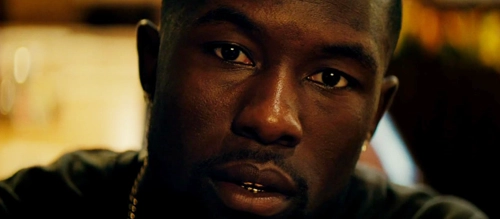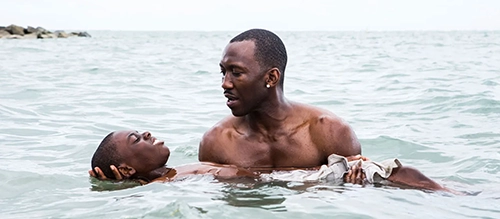Moonlight (2016) Review

Moonlight (2016)
Director: Barry Jenkins
Screenwriter: Barry Jenkins
Starring: Alex Hibbert, Ashton Sanders, Trevante Rhodes, Mahershala Ali, Janelle Monae, Naomie Harris, André Holland
Throughout our lives, we are constantly searching for parallels of our own experiences. In the passing windows of cars, in the ripples of a soundwave, in the lines of a friendly face – we are desperately seeking voyeuristic insight into who we are. And, for many, the gaps can be filled by the projected light of the cinema. It is rare, but there will be several films in your life that touch you in a way nothing will ever come close to. They will breathe fresh life into stagnant lungs, push you back onto your feet and smile, saying: ‘I have felt this too.’ And, with characters Roger Ebert termed ‘real, three-dimensional and unforgettable,’ Moonlight is a picture that has done just that for so many.
Ever since the 89th Academy Awards, Moonlight’s reputation has mostly boiled down to its notorious Best Picture win. The scandal seemed to negate any remembrance of its achievements or its potent messaging. Originally conceived as a play, Moonlight is a glittering depiction of masculinity, identity, and sexuality. Its emotional depth and brutal heart earned it credibility from its critics. The New York Times and The Guardian were just a few of the publications citing it as one of the 21st century’s best films. And, from the general public’s reception grew the most verdant of roses.
Spanning across three chapters, Moonlight explores the life of Chiron. As a child, Chiron is withdrawn, quiet and sensitive. His life lacks stability in his crime-heavy Miami hometown. He is bullied, and his drug-fuelled mother Paula (Naomie Harris) provides him with little comfort. A father-figure is soon found in Juan (Mahershala Ali), a drug dealer who takes him under his wing. Alongside his partner Teresa (Janelle Monae), they raise Chiron, teaching him to swim through troubled waters. A teenage Chiron finds things more difficult still; peer pressure warps his sense of self, and he seeks guidance from his best friend, Kevin. Thus, by the time he reaches his adulthood, Chiron has a weighty decision to make: what kind of identity does he want to forge?
Moonlight possesses the kind of power that could rip firmly-planted trees from their roots; it sputters and it judders, it flows and it flies. It is first and foremost a story about connection – connection to family, to friends, to lovers, but most importantly to ourselves. Director Barry Jenkins uses this triptych to preach of the universality of identity and how it can make or break us. His work as a producer on Aftersun (2022) is evident here; he floods the film’s every corner with an understatedly ethereal atmosphere. It resides at the intersection between arthouse and hood film, creating a brand-new canvas for his characters.
The role of Chiron is shared by three actors, who were not allowed to converse on the film’s set. This was an intentional choice by Jenkins, so as to allow them to develop their own identities for Chiron. Each performance places Chiron under a new lens but his essence never waivers. As a child, Chiron (played by Alex Hibbert) is reclusive; his head is constantly bowed in submission to the terrors around him. He is frightened by the space he cannot seem to occupy and, as a result, he cannot find his voice. The teenage Chiron is played by Ashton Sanders, who achieves the volatility of adolescence. He acts out, plagued by angst, as he cannot decide between a fight or a kiss. As an adult, Chiron (Trevante Rhodes) is a man changed. He is muscular and shielded by gold jewellery, but with an identity not fully realised. A voice has been found, but whose is it? Is it Juan’s? Is it his mother’s? We can still observe the young Chiron in the tilt of his head. He is neatly contrasted by his childhood friend Kevin (played as an adult by André Holland). Holland’s Kevin is charming in his self-confidence; he is aware of what he has grown into. This exacerbates the lack of identity in Chiron, as he asks him repeatedly who he is.

In less than twenty minutes, Mahershala Ali commands the film’s focus. As Juan, he is irrevocably nurturing. As he imparts his wisdom to a young Chiron, Ali’s depth of emotion spans oceans; we can see Juan almost observing his younger self as he looks at Chiron. As he teaches the boy to swim, it as is if the whole universe moves for them. Similarly, the performances by Janelle Monáe and Naomi Harris allow for a dire tension between found family and blood family. Monáe’s Teresa is supporting, light and warmly encouraging; she teaches Chiron to lift his chin in pride. Harris’ performance as Chiron’s mother is much bleaker. Riddled by the effects of drugs, her deterioration is harrowing to witness, making her cruel and inhuman.
Jenkins handles Moonlight’s themes with a loving touch. He crafts symbols to place in the sky like stars. For instance, the portrayal of Chiron’s self-discovery is painted with motifs. There are frequent references to colour, in particular black versus blue. The dichotomy between the two shows the tension that hangs between toughness and vulnerability. Water is also used to convey ideas around sexuality and transformation. Much like in A Streetcar Named Desire (1951), water is used as a means of emotional cleansing. Washing his face becomes a meditative practice for Chiron, which he learned as a teenager. And his swimming lessons in the sea represent the overwhelming nature of his sexuality; it is tumultuous and volatile because he does not yet understand how to embrace it.
Described as ‘deceptively mellow, and shot through with searing compassion’ by David Rooney, Moonlight’s cinematography is slickly clear-cut. The scenes are languid and sunkissed, leaving its characters glowing like gold. However, the emotional notes are neatly contrasted by the turbulent action sequences. The queasy camera shakes when centring on the ripples of the sea or the thrusts of a fight. It drops us amongst Chiron, as a companion and as a weary bystander.
Nicholas Brittell’s use of strings and piano notes puts a beautiful spotlight on the film’s sensitivity. This is cleverly intertwined with R&B and hip-hop tunes, adding a playful sense of character. However, it is the film’s reliance on natural sounds that elevates it even more. Similar to Portrait of a Lady on Fire (2019), there are many scenes where we are simply given two things – the natural connection of the characters and the sound of the wind.
Where Moonlight falls short is in its omission of details. Throughout the film, there are crucial moments that are lost in a time skip. These are often events that would be crucial to Chiron’s own journey, causing a disconnect. Suddenly, we cannot see a complete picture and thus, we are less involved in his story. Worsening this still is the persistent use of the shaky camera perspective. It becomes all too easy to get swept up by its perpetual motion and then we are lost even more.
Moonlight beats with a fiery pulse, flooding its way into every corner of your soul. It tells the simple story of a boy searching for who he truly is, but its gravitas cannot be faulted. It invites us to raise our heads in unison with Chiron but to bow them at the irrepressible: our own identities. Each aspect of this film is united, flexing like a wiry muscle; it feels as truthful as the skin on your palm. So, if you are looking for a film that will touch you, look no further. To float amongst the waves with Chiron is an experience we all must have.
Score: 22/24
Written by Bella Madge
You can support Bella in the following places:
Substack: BellaWatchesFilms
Instagram: @bellawatchesfilms
TikTok: @bellawatchesfilms
Picturehouse Fresh Takes: Name Me Lawand Review

